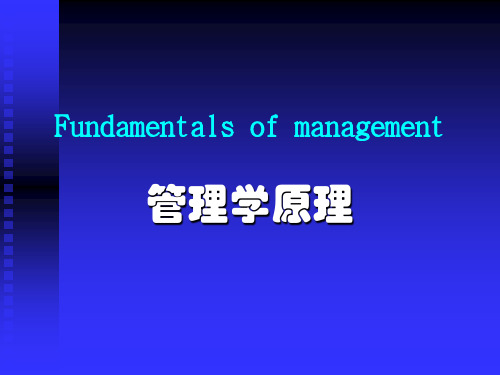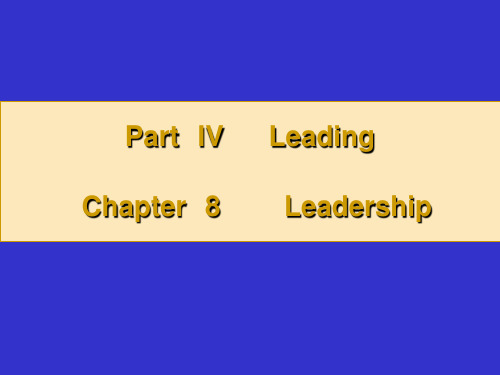《管理学英文版》
- 格式:ppt
- 大小:205.00 KB
- 文档页数:65



课程思政《管理学(全英)》课程教学大纲一、课程基本信息课程代码:18220743课程名称:《管理学(全英)》英文名称:《Management》课程类别:学科基础课学时:48学分:3适用对象:2019财务管理1班(2+2中外合作人才培养实验班)考核方式:考试先修课程:西方经济学等二、课程简介Management is a basic course for management majors,which is set for junior students of management majors.This course serves as an introduction to the discipline of management.It is designed to integrate the accepted theories in the area with real world applications to provide students with the basic knowledge and skills needed for managing others.This course begins with a discussion of the current issues in management and then proceeds to cover the traditional functions of management:planning,organizing,leading, and controlling.Lecture and class assignments given in the course are intended to help students understand the needs of modern public and private organizations,including emerging national and international trends.三、课程性质与教学目的The course“management(all English)”aims to give a comprehensive and preliminary introduction to management and arouse students'thinking on current management issues. This course is a basic course for the related major of management,which provides the foundation for the study of subsequent subjects.This course will systematically expound the four basic aspects of management:planning,organization,leadership and control,andwill try to apply the theory into case analysis under the guidance of teachers.At the end of the course,students should be able to analyze problems in the management field from a more professional perspective and master common technical terms in the field.Due to the basic course of management,the study of this course also lays a foundation for the subsequent study of related courses,such as strategic management,human resource management,e-commerce,organizational behavior,etc.This course uses English textbooks and the classroom language is English.Therefore,it has a higher requirement for the teaching object.Students should generally have a high level of English,and have strong oral English ability.Through the study of this course,four teaching objectives can be achieved:1.The construction of management knowledge system:to enable students to master thebasic concepts and connotations of management,various management theories, knowledge construction and curriculum system construction.2.The improvement of various skills:to enable students to think and analyze themanagement phenomenon in today's business environment with all kinds of knowledge, and break through traditional knowledge to achieve thinking innovation.3.The improvement of English listening,speaking,reading and writing ability:as thiscourse is an all-English teaching form,it will have requirements on students'English skills in all aspects.4.The strengthening of ideological and political education:to enable students tocomprehensively and objectively understand contemporary China and look at the outside world,be good at distinguishing right from wrong,and form a stand,viewpoint and method for observing and understanding contemporary world and contemporary China.四、教学内容及要求Chapter1The introduction of management:history,concepts and framework Chapter main Contents:1.Tell who managers are?2.What three characteristics do all organizations share?3.What’s the definition of management?4.Make comparison between managers and non-managerial employees.5.Three ways to look at what managers do.6.Explain why it’s important to study management.7.Describe the factors that are reshaping and redefining management.8.Scientific Management,General Administrative Theory,Behavioral Approach,Systems Approach.Chapter Objectives:Emphasis:1.Understand three Common Characteristics of Organizations.2.what’s the difference between Managers and non-managerial Employees?Difficulties:what does a manager do?Elements of ideological and political education:patriotismChapter Assignments:Please list at least three kinds of job titles in modern company and attribute these titles to four management levels.Chapter2The management environment analyses and applicationChapter main Contents:1.Explain what the external environment is and why it’s important?2.Discuss how the external environment affects managers?3.Define what organizational culture is?4.Describing the dimensions of organizational culture.5.How organizational culture affects managers?Chapter Objectives:Emphasis:what does external environment include?And how these factors affect the management?Difficulties:know the organizational culture?And how to evaluate an organization’s culture?Elements of ideological and political education:an international visionChapter Assignments:Please select one industry you are interested in and make the analyses about it’s external environment?Chapter3Integrative managerial issuesChapter main Contents:1.How to understand the concept of“globalization”and its reflection.2.What’s the influence of globalization on organizations?3.How organizations go global?And what are the different types of globalorganizations?4.What managers need to know about the management in global business?5.Discuss how society’s expectations are influencing managers and organizations.6.Discuss the factors that lead to ethical and unethical behavior in organizations.7.Describe how the workforce is changing and its impact on the way organizations aremanaged.Chapter Objectives:Emphasis:1.The meaning of globalization and it’s effect on management2.the diversity of workforceDifficulties:understanding the effect of firm globalization on company management.Elements of ideological and political education:an holistic viewChapter Assignments:Please conclude the effects of globalization effects on company management.Chapter4Foundation of decision makingChapter main Contents:1.Describe the decision-making process and some points about every step.2.What common errors are committed in the decision-making process?(12commondecision errors)3.Explain the three approaches managers can use to make decisions.4.Describe the types of decisions and decision-making conditions managers face.5.Discuss group decision-making,knowing the advantage and disadvantage of groupdecision making.6.When are groups most effective?7.Discuss contemporary issues in managerial decision making(national culture,creativity and design thinking,big data)Chapter Objectives:Emphasis:The three levels of analysis in the OB model.Difficulties:The need for a contingency approach to the study of OB.Elements of ideological and political education:socialism with Chinese characteristicsChapter Assignments:Think over whether you have made some errors in decision making?What’s it?Chapter5Foundation of planningChapter main Contents:1.Discuss the nature and purposes of planning?2.Since changing is ever-stopping,is the formal planning necessary?3.Explain what strategic includes and what managers do in the strategic managementprocess?4.What strategies do mangers use?pare approaches to goal setting and planning.6.How do managers set goals and develop plans?7.What contemporary issues in planning do managers face?Chapter Objectives:Emphasis:1.The company strategy system2.The content of MBO3.The steps and methods of goal-settingDifficulties:1.The essence of MBO2.The company strategy systemElements of ideological and political education:confidence in our path,in our theoriesChapter Assignments:If“The don’t change thing is change itself”is the real fact,what’s the meaning of planning?Chapter6Organizational structure and designChapter main Contents:1.What are the six key elements in organizational design?(specialization,departmentalization,authority,span of control,centralization,formalization)2.Identify the contingency factors that favor either the mechanistic model or theorganic model of organizational design.pare traditional and contemporary organizational designs.4.Discuss the design challenges faced by today’s organizations.(keep employeesconnected,global difference,building a learning organization,flexible workarrangement and so on)Chapter Objectives:Emphasis:The six key elements in organizational design.Difficulties:The design challenges faced by today’s organizations.Elements of ideological and political education:confidence in our systemChapter Assignments:Do you think the traditional hierarchical structure still have life today? Chapter7Managing human resourcesChapter main Contents:1.Describe the key components of the human resource management process andthe important influences on that process.2.What’s employment planning?And what’s the two steps of it?3.How do organizations recruit employees?And how to handle layoffs?4.How do managers select competent employees?5.What is employees are provided with needed skills and knowledge?6.Describe strategies for retaining competent,high-performing employees.7.Discuss contemporary issues in managing human resources.Chapter Objectives:Emphasis:1.The process of human resource management;2.How to compensate the employees;3.How to retain competent,high-performing employees.Difficulties:Grasping the process of HRM and how to match the job requirements and employee?Elements of ideological and political education:China’s national conditionChapter Assignments:How to retain the90s and00s employees?Chapter8Managing change and innovationChapter main Contents:1.Define organizational change and the categories of organizational change.2.what forces lead to organizations make change?pare the change process.(CALM WATERS VS.WHITE-WATERMETAPHOR)4.what forces resist the organization change?5.Explain how to manage resistance to change?6.What managers need to know about employee stress?7.Discuss techniques for stimulating innovation.Emphasis:1.What’s organizational change are companies confronted with?2.What can the companies do to eliminate the employees’stress?3.How to create innovation?Difficulties:What can companies do to make the organization more creative?Elements of ideological and political education:a sense of prideChapter Assignments:1.What method do you know about prompting one more creative?2.Do you have some method to decrease the stress?Chapter9Group and managing work teamsChapter main Contents:1.What’s the definition of group and what are the stages of group development?2.Describe the five major concepts of group behavior.(roles,norms andconformity,status systems,group size,group cohesiveness)3.How groups are turned into effective teams?From context,composition,workdesign and process perspectives.4.What contemporary issues do managers face in managing teams?(managingglobal team,)Chapter Objectives:Emphasis:1.how to build an effective work team?2.what issues does a manager must confronted with in new environments?Difficulties:How to build an effective work team?Elements of ideological and political education:organization confidenceChapter Assignments:Do you want to work in team or work individually?Why?Chapter10Motivating and rewardingChapter main Contents:1.Define and explain motivation and what’s three elements of motivation?pare four early theories of motivation(Maslow’s Hierarchy of NeedsTheory,X-Y Theory,Two-Factor Theory,McClelland’s Three-needs Theory)3.What’s goal-setting theory?4.How does job design influence motivation?5.What’s equity theory?6.What current issues do managers face in motivating employees?Chapter Objectives:Emphasis:Compare and integrate the classical and modern motivation theoryDifficulties:How to apply these motivation theories to realities?Elements of ideological and political education:responsibilityChapter Assignments:What factors can motivate you working harder?Chapter11Leadership and trustChapter main Contents:1.Who is leader and what is leadership?2.What traits do leaders have according trait theory?3.What behaviors do leaders exhibit?4.Describe the four major contingency leadership theories.5.Describe modern views of leadership and the issues facing today’s leaders.6.Why trust is the essence of leadership?Chapter Objectives:Emphasis:How to understand the contingency leadership theory?Difficulties:How to understand the essence role of trust in leadership?Elements of ideological and political education:integrity and honestyChapter Assignments:Imaging you are a leader,what do you want to do to build the trust relationship with employees?Chapter12Managing communication and informationChapter main Contents:1.Describe what managers need to know about communicating effectively.2.Explain how technology affects managerial communication.3.Discuss contemporary issues in communication.Chapter Objectives:Emphasis:1.What’s the process of communication?paring written communications and verbal communication.3.Which factors will lead to the ineffectiveness in communication?4.How to enhance the communication effect?5.Understanding the effects of some technology on managing communication.6.What communication issues do managers face today?Difficulties:How to tackle the resistance when communication?Elements of ideological and political education:development and innovationChapter Assignments:Please recall the last low-efficient communication case in your daily life and analyze the reason.Chapter13Foundation of controlChapter main Contents:1.What is control and why control is important?2.Describe the three steps in the control process.(get measuring,compare actualperformance to planned goals,take actions)3.When does control take place?4.Discuss the types of controls organizations and managers use.5.What contemporary control issues do managers confront?Chapter Objectives:Emphasis:Grasp three kinds of control.Difficulties:When does control take place?Elements of ideological and political education:ideal and faithChapter Assignments:Which method do you think is most effective when controlling?why?五、各教学环节学时分配Presentation and debate033 Chapter9Group and managing work teams33 Chapter10Motivating and rewarding(I)33 Chapter10Motivating and rewarding(II)213 Chapter11Leadership and trust33 Chapter12Managing communication and213 informationChapter13Foundation of control33 Review and answering033六、推荐教材和教学参考资源1、《21世纪的管理挑战》,彼得.德鲁克著2、《创新者的窘境》&《创新者的解答》,克莱顿•克里斯坦森著3、《竞争战略》迈克尔.波特著4、《影响力》罗伯特.西奥迪尼著5、《定位》艾·里斯,杰克·特劳特著6、《商战》杰克•特劳特/阿尔•里斯著7、《联盟:互联网时代的人才变革》里德·霍夫曼著8、《重新定义管理》布赖恩·罗伯逊著七、其他说明大纲修订人:田野修订日期:2020/12/10大纲审定人:赵明审定日期:2020/12/16。



Unite 1. Precursors in Management Theory管理理论的先驱们Read the following questions first, which will help you understand the text below better, and then answer the questions after reading the text carefully.先看看下面的问题,这些问题将有助于你更好地理解后面的课文,仔细地读完课文后再回答这些问题。
l. Why did Kenneth Feld consider management as "the greatest job on earth"?为什么肯尼斯-费尔德把管理看做地球上最伟大的工作?2. How can work be done most efficiently according to your opinion based on management knowledge?根据自己的管理知识,你认为怎样工作才能最有效率?3. What is the real meaning of the phrase –“management theory jungle”?术语“管理理论丛林”的真正含义是什么?4. Why is Frederick Winslow Taylor regarded as the Father of Scientific Management?为什么人们把弗雷德里克-温斯洛-泰勒视作科学管理之父?5. What is the main idea of Taylor's famous book, The Principles of Scientific Management?泰勒著名的《科学管理原理》一书,主要观点是什么?Dating back to the ancient times, we may discover that the basic principles of management had their beginnings in the birth of civilization, when people first began to live in groups and first sought to improve their lot in life. Ever since people began forming groups to accomplish aims they could not achieve as individuals, managing has been essential to ensure the coordination of individual efforts. Kenneth Feld, president of Ringling Bro. and Barnum & Bailey Circus, once described management as "the greatest job on earth", for one of the most important human activities is managing.追溯到古代时候,我们可以发现管理的基本原理在文明起源之时就已经开始了(存在了),(在那时)当人们最早开始群体生活,最早寻求改善生活。
第一章1.管理职能:计划、组织、领导、控制。
management functions: planning、organizing、leading、controlling.2.管理角色〔management roles〕、①人际关系角色:挂名首脑、领导者、联络者Interpersonal:figurehead、leader、liaison②信息传递角色:监听者、传播者、发言人Informational: monitor、disseminator、spokesperson③决策制定角色:企业家、混乱驾驭者、资源分配者、谈判者Decisional: entrepreneur、disturbance handler、resource allocator、negotiator3、管理技能〔management skills〕概念技能、沟通技能、效果技能、人际技能Conceptual、communication、effectiveness、interpersonal4、组织的特点①有明确的目的〔distinct purpose〕②有人员构成〔people〕③有精细的结构〔deliberate structure〕第二章1、管理理论〔management theories〕:科学管理〔scientific management〕一般行政管理理论〔general administrative theorists〕定量方法〔quantitative approach〕组织行为〔organizational behavior〕系统观〔systems approach〕权变理论〔contingency approach〕第三章1、管理万能论〔omnipotent view of management〕管理象征论〔symbolic view of management〕2、组织文化的七个维度〔dimensions〕关注细节,成果导向,员工导向,团队导向,进取性,稳定性,创新与风险承受力Attention to detail, outcome orientation, people organization, team organization, aggressiveness, stability,innovation and risk taking 3、文化传播给员工的途径:故事,仪式,有形信条,语言Stories,ritual,material symbols,language4、创新的文化的特点①.挑战与参与〔challenge〕②. 自由〔freedom〕③. 信任和开发〔trust and openness〕④. 计划时间〔idea time〕⑤. 幽默〔playfulness/humor〕⑥. 冲突解决〔conflict resolution〕⑦. 讨论〔debates〕⑧. 冒险〔risk taking〕第六章1、决策制定过程〔the decision-making process〕①.识别决策问题〔identification of a problem〕②.确定决策标准〔identification of decision criteria〕③.为决策标准分配权重〔allocation of weight to criteria〕④.开发备份方案〔development of alternatives〕⑤.分析备份方案〔analysis of alternatives〕⑥.选择备择方案〔selection of an alternatives〕⑦.实施备择方案〔implementation of the alternatives〕⑧.评估决策结果〔evaluating decision effectiveness〕2、决策制定的错误〔decision-making errors and biases〕:自负〔overconfidence〕后见〔hindsight〕自利型〔self-serving〕沉没成本〔sunk costs〕随机性〔randomness〕典型性〔representation〕有效性〔availability〕框架效应〔framing〕证实〔confirmation〕选择性认知〔selective perception〕锚定效应〔anchoring effect〕即时满足〔immediate gratification〕4、计划工作〔planning〕:①、定义组织目的〔defining the organization’s goals〕②、制定全局战略〔establishing an overall strategy〕③、开发一组广泛的相关计划〔developing plans〕5、计划的目的〔purposes of planning〕:①、它给出了管理者和非管理者努力的方向〔planning provides direction to managers and nonmanagers alike〕②、它通过迫使管理者具有前瞻性来降低不确定性〔planning reduce uncertainty by forcing managers to look ahead, anticipate change, consider the impact of change, and develop appropriate responses〕③、计划可以减少活动的重复和浪费〔planning minimizes waste and redundancy〕④、计划设定目标和标准,可以用于控制〔planning establishes the goals or standards used in controlling〕6、计划和绩效〔planning and performance〕①正式的计划工作通常带来较高的绩效、较高的资产回报率,以与其他积极的财富Formal planning is associated with positive financial results such as higher profits, higher return on assets, and so forth.②计划工作的质量以与实现计划的适当措施,通常要比计划工作本身对绩效的贡献更大Doing a good job of planning and implementing those plans play a bigger part in high performance than does the extent and amount of planning done.③正式计划并不必然的导致至高绩效,外部环境的影响通常是更关键的Formal planning didn’t lead to higher performance, the external environment often was the culprit.④计划与绩效的关系还受到计划时间结构的影响。